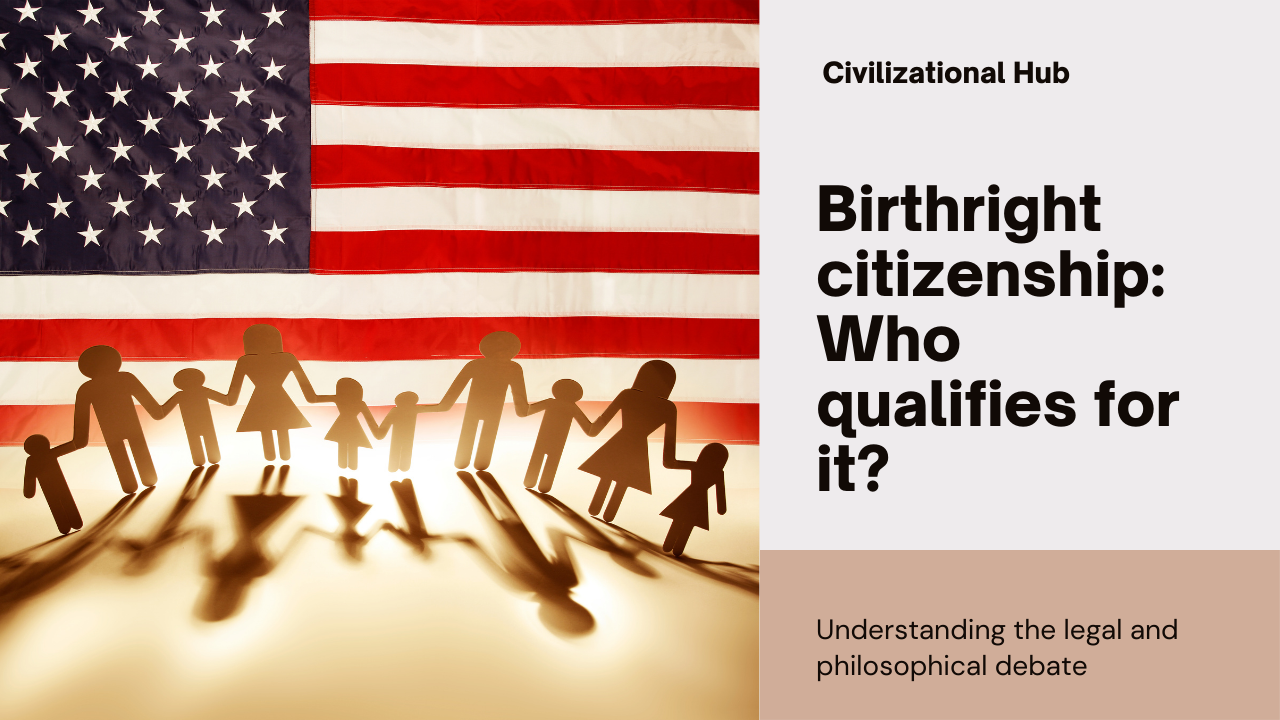Civilization
Who is entitled to birthright citizenship?
As the President provokes court challenges with his birthright citizenship executive order, a though experiment puts it in the proper light.

Since this question is very much in the news due to President Trump’s policy on birthright citizenship, it is more than appropriate to research the matter.
Birthright citizenship defined
Before delving into the answer, one must consider exactly what is birthright citizenship? Trump has signed an Executive Order (EO) declaring that children of foreign nationals born in this country are not to be considered citizens of the United States. The controversy comes into play because of the 14th Amendment to our Constitution that was written to protect the citizenship rights of emancipated slaves that were born here during and prior to the Civil War.
The answer of national citizenship depends on what the country in question happens to be. For the purpose of this writing, the country in question will be Mexico. Before delving into the particulars that argue for President Trump’s EO, one must consider that a human being is only to be assumed the national of one country, unless and until dual citizenship is requested, a nationalization legal process is pursued, or at least one parent is – in this case – an American citizen. This request follows legal steps that must be followed.
Dual citizenship not the default
Dual citizenship – as far as this writer knows – is never just bestowed upon someone without going through the proper channels. As for Mexico, the Mexican Constitution was ratified in 1857 and the step required for dual citizenship are spelled out. More importantly for this argument, according to the 30th article in the Mexican Constitution entitled “nationality by birth” nationality is determined by birth, stating that a Mexican national is a person born to at least one parent who is a national of Mexico. The children of Mexican nationals are considered to be Mexican nationals.
Therefore, it is logical to assume that children born here from at least one Mexican parent is considered to be a Mexican national by the Mexican government, according to their Constitution. So, I will conclude by arguing that unless a child born here of at least one Mexican parent and no American parent, cannot be considered a US citizen unless they apply for dual citizenship and go through the proper procedures.
In light of the above, Mexican children born here to at least one Mexican parent and no American parent cannot enjoy birthright citizenship because they simply are not Americans. They are considered to be Mexicans.
RoseAnn Salanitri is a published author and Acquisition Editor for the New Jersey Family Policy Council. She is a community activist who has founded the Sussex County Tea Party in her home state and launched a recall movement against Senator Robert Menendez. RoseAnn is also the founder of Veritas Christian Academy, as well as co-founder of Creation Science Alive, and a national creation science speaker.
-

 Executive5 days ago
Executive5 days agoWaste of the Day: Secret Settlements get Taxpayer Money
-

 Accountability2 days ago
Accountability2 days agoWaste of the Day: Principal Bought Lobster with School Funds
-

 Executive13 hours ago
Executive13 hours agoHow Relaxed COVID-Era Rules Fueled Minnesota’s Biggest Scam
-

 Constitution2 days ago
Constitution2 days agoTrump, Canada, and the Constitutional Problem Beneath the Bridge
-

 Civilization12 hours ago
Civilization12 hours agoThe End of Purple States and Competitive Districts
-

 Civilization4 days ago
Civilization4 days agoThe devil is in the details
-

 Executive4 days ago
Executive4 days agoTwo New Books Bash Covid Failures
-

 Civilization3 days ago
Civilization3 days agoThe Conundrum of President Donald J. Trump










Only two groups of people produce US Citizens via Amendment 14. They are US Citizens and foreign nationals bound by an oath of fealty to the US. Illegal aliens, visitors, diplomats, people here on student Visas, etc, do not produce US Citizens via Amendment 14. I shaer the following on various sites:
When covering the false claim that just being born in the US makes one a US citizen the following information I posted on my Facebook page is important since it references what the US Supreme Court pointed out in the late 1800s.
As people read about the deportation of illegal aliens remember children born to illegal aliens are NOT US citizens. When people see references to the US Supreme Court Ark case note how the actual text is ignored. Ark’s parents were legal immigrants to the US and bound by an oath of fealty to the US. Or to put it another way they could be charged with the crimes of sedition or treason. People ignore the Amendment 14 clause “and subject to the jurisdiction thereof” which is referencing jurisdiction of citizenship. Consider, while not a citizen a slave had fealty to the US and could be charged with treason or sedition. Another US Supreme Court case people ignore is the ELK case. ELk was a native American tribal member who renounced his tribal membership and tried to register to vote. THe US Supreme Court pointed out he was NOT a US citizen and that Amendment 14 did NOT give him US citizenship. Native American Tribal were made US citizens in 1924 via a law authorized by Article 1 Section 8 Paragraph/Clause 4 of the US Constitution. The only people that produce US citizens via birth in the US are US citizens or foreign national bound by an oath of fealty to the US. That is real immigrants or some foreign nationals who enlisted in the US military. Illegal aliens, visitors, migrant workers, diplomats, people here on student VISAs, etc., do not produce US citizenship via Amendment 14. At least one parent must have fealty to the US for a child born in the US to get US citizenship via Amendment 14. The Elk case also references what those who wrote Amendment 14 stated.